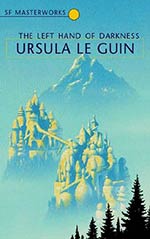
![]() couchtomoon
couchtomoon
8/1/2014
![]()
Somebody in the menopausal supplement industry reads classic SF and has a sense of humor, because it can't be a coincidence that the main supporting character in Ursula Le Guin's Left Hand of Darkness shares a name with the popular brand name supplement I have spied in the pharmaceutical aisle. Estreven, the character, and Estroven, the supplement, both deal with the consequences of fluctuating hormonal changes, but for Therem Harth rem ir Estraven, the changes are embraced.
Before the male readers of this blog bolt, The Left Hand of Darkness is not a story about menopause, although hormone changes and fluctuating sexuality are common themes.
Reviewing Le Guin's engaging and brilliant 1969 novel, Left Hand of Darkness, is an impossible and intimidating task. Only a dissertation can do this novel justice, and I doubt I have anything of value to add to the mountain of praise that already exalts this book. It's a masterpiece. You need to read it. You really need to read it.
In the distant future, Genly Ai, a Terran human, is assigned as the first-contact diplomat to the planet of Gethen, a frozen planet of ambigendered individuals. He begins his work in the nation of Karhide, but fails to capture the king's interest to participate in galactic relations. Genly takes his case to Karhide's rival nation of Orgoreyn, where the contrasting democratic political situation seems more amenable to his cause, but a warning from exiled Karhiddish Prime Minister Estreven foreshadows danger in a world where war does not exist, but scheming and cruelty do.
A lot of comparisons have been drawn between Lord of the Rings andLeft Hand of Darkness, but I don't really see it. Besides the impact both tales may have on our hearts—and a quest through snow– Le Guin's novel stands on its own, and it serves a different purpose. LHOD is more than a world-building tale about friendship and strength of character. It generalizes, without simplifying, the human condition. It contributes to society, not just as a tale, but as an honest tableau of what we are, and what we fear to be.
Maybe it's the world-building that leads to these comparisons. Yes, the world of Gethen is fully-realized, but it's not conveyed in a descriptive manner. Sure, there are gorgeous moments of wooded hikes, ice-tunnel villages, and volcanic glaciers, but most of the world-building takes place as a reflection of its inhabitants. Le Guin employs my favorite storytelling device, the collage, in which each chapter is a different narrative style. Some chapters are from Genly's journal, others are from Estreven's journal, yet still others (and some of the best!) are the folkloric tales of the Gethenian people. This is where the true world-building occurs, as those little stories provide windows to this unbearably cold planet and its taciturn people. It's not "world-building," it's world-revealing, which is how it should be.
And sometimes what Le Guin doesn't tell us is just as important as what she does. Each time I thought I caught her in a plot hole, a detail would emerge to explain. I wondered why this ancient society has stagnated in the middle of an early industrial age. "Why no planes?" I ask in my notes. But later we learn that the freezing climate of Gethen has inhibited evolution as we know it. No flying animals exist. There are no birds to mimic. And, as I realize after a few days of mulling, a world with no war has less motivation for hi-tech innovation. Without a couple of world wars, where would our technology be?
With LHOD (and the rest of the Hainish cycle novels), Le Guin's ideas seem to spring from an urge for political and social experimentation. Her stories are a laboratory in which she tests and measures government systems and social roles. Le Guin pulls no punches, softens no stats. The data is the story, and you may not like the results. Maybe democracy breeds treachery. Maybe world peace isn't peaceful. Maybe gender is a perverted social construct. But this is no contrived science fair project. The results are the story, and the story is organic. That warm, lingering uncertainty will follow you long after you turn the final page.
LHOD is whatever you want it to be. You can tug at any edge and unravel entire strands of elucidation. Any strand can be deconstructed into still smaller strands, and the sensuous experience of that tug is oh, so gratifying. But for readers who just want a good story, LHOD still satisfying in its entirety.
http://couchtomoon.wordpress.com